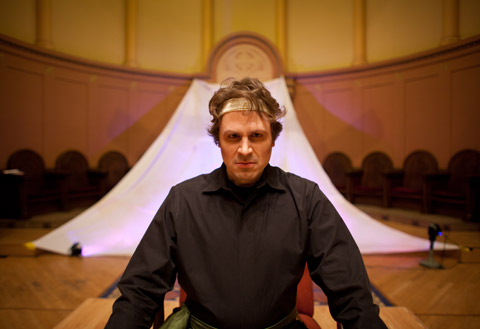
RARITY Jacob Cooper was Saul in Helios Early Opera’s production of Charpentier’s David et Jonathas. |
There's a new group in town doing Baroque opera — not an easy ambition. But I thoroughly enjoyed its first major production, and I hope people will be on the lookout for their next. The group is Helios Early Opera, and the production, at the First Congregational Church in Cambridge (the one with the difficult acoustics), was an ambitious one: only the second American production of Marc-Antoine Charpentier's David et Jonathas, the Biblical story of the love between the young warrior David and Jonathan, the son of King Saul, who suspects that David wants to take over his throne. Like Handel's oratorio masterpiece Saul, this is not only a study of a loving relationship between two young men (with whom, the program note suggests, Charpentier might have identified) but also a profound exploration of Saul's paranoia.The music is gorgeous — maybe the most beautiful and touching of any of the Charpentier operas I've heard (including Medée, his most famous). The first of its five acts includes an unearthly solo for the ghost of Samuel (bass James Dargan) accompanied by four violas da gamba. Canadian stage director Aria (what a perfect name for an opera director!) Umezawa had Samuel wrapped in a white sheet and placed the four gambas at each corner of the stage: a shivery visual image to accompany an eerie sound.
I liked most of Umezawa's concepts: the black pants and shirts for everyone, the white masks for the ghosts, the crimson sashes that unfurled into images of blood pouring out. She has an elegant sense of space, and used the entire church floor and even the balcony to deliver the action. I liked the way that in the stylized battle scenes, the victor took the arm of the victim, lifted him up, then became the former victim's victim, in a never-ending circle of deaths and victories. I wouldn't have had the spirits laugh as they ran up and down the aisles — too corny and high-schoolish a gesture for such sophisticated musical staging.
Charpentier's choruses, which were especially well delivered, are particular gems, especially the sweet one encouraging us to follow our desires; or the one seductively interacting with David; or, most sublime, the great lament over the death of Jonathan ("jamais . . . jamais . . . jamais"), and the marvelous celebratory conclusion, the chorus calling for trumpets and drums ("trompettes et tambours") while David takes the throne sunk in despair over the loss of Jonathan. It's the saddest happy ending I can think of in opera.
Tenor Owen McIntosh was particularly well-cast as David. He sings with vocal energy and rhythmic bite, even when David is downhearted. And with his curly bangs, he even looks the part. Soprano Linda Tsatsanis sang Jonathan (a part surely written for a male soprano, since this was first performed at a Jesuit college a hair under 324 years ago) with amplitude and pungent, vibratoless tone. I've seen more convincing male impersonations by other sopranos, though, and Tsatsanis made the love duets a little too girl-and-boyish. Baritone Jacob Cooper was a vigorously conflicted Saül, and reminded me a lot of David Ripley in the title role of the unforgettable Peter Sellars/Craig Smith staging of Handel's Saul back in 1981. Tenor Màrcio de Oliveirawas a snaky villain, mezzo-soprano Sophie Michaux a powerful sorceress (a/k/a, the Witch of Endor), and Canadian baritone Keith Lam was a firm but small-voiced Achis, the Philistine king who stands by David. He was the biggest victim of the First Church acoustics, which especially swallowed up anyone who sang near the back of the playing area.